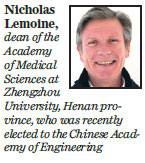China can lead the world in new medicine
I've been working in China for 10 years, so I am aware of the significance of being recognized as an academician. Liu Jiongtian, president of Zhengzhou University, is already a member, but I never imagined that one day I might also be honored as an academician. I feel very proud.
The sheer scale of the patient population in China is the major difference (from the United Kingdom), both as an opportunity and a challenge. In Zhengzhou, I work at the First Affiliated Hospital, the largest in the world and more than 10 times larger than Bart's (St. Bartholomew's Hospital), where I work in London. In China, most patients only see doctors in the hospital, whereas in the UK most healthcare is delivered outside hospitals by general practitioners in primary care.

It has been exhilarating to create the Academy of Medical Sciences at Zhengzhou University and recruit top talent from across the world to research the most important health problems. Our work developing new therapies and vaccines for cancer is going well, and we are branching out into new areas, such as stem cell technology.















